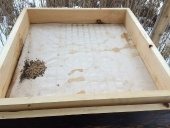




Lawrence London
lfljvenaura@gmail.com
EcoLandTech
http://ecolandtech.blogspot.com
http://ibiblio.org/ecolandtech








http://www.greenshireecofarms.com
Zone 5a in Central Ontario, Canada




Lawrence London
lfljvenaura@gmail.com
EcoLandTech
http://ecolandtech.blogspot.com
http://ibiblio.org/ecolandtech




Lawrence London
lfljvenaura@gmail.com
EcoLandTech
http://ecolandtech.blogspot.com
http://ibiblio.org/ecolandtech





http://www.greenshireecofarms.com
Zone 5a in Central Ontario, Canada
 2
2




 1
1




Argue for your limitations and they are yours forever.
 3
3




Moderator, Treatment Free Beekeepers group on Facebook.
https://www.facebook.com/groups/treatmentfreebeekeepers/





 1
1




Open feeding - especially of honey - has the potential to spread serious bee diseases. The worst of which is Americans foul brood. When AFB is detected colonies and all contaminated equipment must be burned to contain the spread.
Argue for your limitations and they are yours forever.
 1
1





|
When it is used for evil, then watch out! When it is used for good, then things are much nicer. Like this tiny ad:
permaculture bootcamp - gardening gardeners; grow the food you eat and build your own home
https://permies.com/wiki/bootcamp
|


